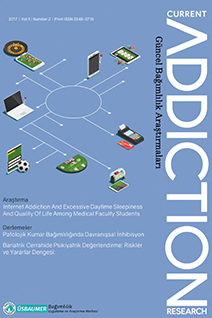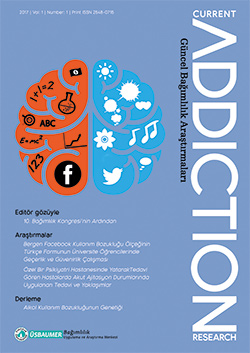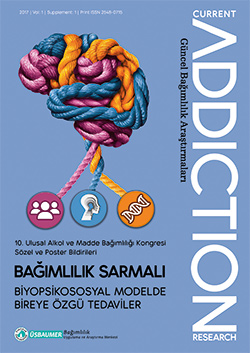Years
2025
2024
2023
2022
2021
2020
2019
2018
2017
Categories
Authors
- ALEJANDRO BORREGO-RUIZ (1)
- Abdullah TÜRKMEN (1)
- Ali Yasin Kafes (1)
- Aslı Zeynep Başabak Bhais (1)
- Aybüke Kaplan (1)
- Birgül CUMURCU Hatice (1)
- Burcu YÜCETÜRK (1)
- Caner ASLAN (1)
- Cemal Onur NOYAN (1)
- Ceyda ŞİŞMAN ÜNLÜ (1)
- DURMUŞ ELİF (1)
- Duygu KILIÇ ÖZTAN (1)
- EMLU HAKAN (1)
- Eda Deligöz (1)
- FİDAN ENİSE KÜBRA (1)
- Gökben Hızlı Sayar (2)
- Gül ERYILMAZ (1)
- Gül Eryılmaz (1)
- Gürler GÜZ (1)
- Gürler Güz (1)
- Hasan Kaya (1)
- Hatice Özyıldız Güz (1)
- Işıl Göğcegöz (1)
- KABA AYŞE (1)
- KABA FATİH (1)
- KARABURUN MERVE (1)
- Mustafa AKAN (1)
- Nesrin Dilbaz (2)
- Rüstem Mustafaoğlu (1)
- Sedef KOÇ BAL (1)
- Selami Ülker (1)
- Sever Yıldırım (1)
- Simge ALEVSAÇANLAR CÜCÜ (2)
- Tijen ŞENGEZER (1)
- Türker Tekin Ergüzel (1)
- Zakirov Fagan (1)
- Çetin Alptekin (1)
- ÖZKAN EZGİ (1)
- Özlem Bolat Kaya (1)
ARTICLES
Review Article
Genetics Of Alcohol Use Disorder
Hasan Kaya,Özlem Bolat Kaya,Nesrin Dilbaz
2017, 1(1), s:33-46
Introduction: Alcohol Use Disorder (AUD) is a chronic
psychiatric disorder characterizes by harmful drinking
patterns leading to negative emotional, physical, and
social outcomes. Twin, family, and adoption studies
have consistently demonstrated that genetic factors
play a critical role in the pathogenesis of AUD. Various
studies have aimed to identify genes that contribute
to susceptibility to AUD. In this paper, we provide
an review of genetic studies on AUD, including twin
studies, linkage studies, candidate gene studies, and
genome-wide association studies (GWAS). Growing
evidence indicates that AUD is a complex genetic
disease, with variations in a substantial number of gene
affecting a person’s risk of AUD. Some of these genes
have been identified, including two genes involved in the
metabolism of ethanol (ADH1B and ALDH2) that have
the strongest known affects on the risk of AUD. Studies
continue to find out other genes in which variants affect
the risk of AUD or related traits, including GABRA2,
DRD2, OPRM1, MAOA and PECR. As more variants
are analysed and studies are integrated for meta-analysis
to obtain increased sample sizes, an enhanced picture of
the many genes and pathways that affect the risk of AUD
will be possible.



 2. Sayı
2. Sayı
 1. Sayı
1. Sayı
 Ek Sayı
Ek Sayı







